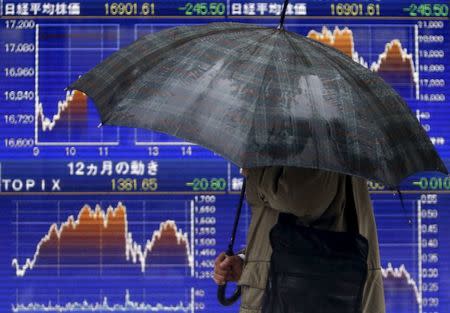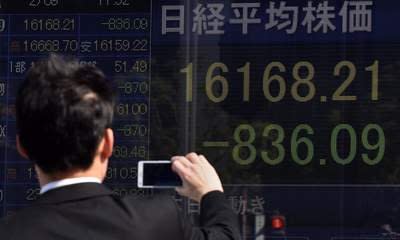FTSE At 2012 Low Amid World Market Rout
The global stock market rout has intensified, with Japan's Nikkei losing 5.4% of its value in a horror show of a trading day that saw a rush for safe havens such as gold and the yen.
The sell-off followed Monday's lead on the European and US stock markets when they endured further losses on top of those already witnessed since the start of the year with jitters about the global economy taking a strangle hold on investments.
The FTSE 100 and its European counterparts sank further into the red on Tuesday - with the FTSE trading at its lowest intra-day level since November 2012.
Miners and banking stocks were enduring the most pain.
It was a similar story in Tokyo though the climb in the yen's value placed export-facing companies in the firing line too, culminating in the Nikkei's worst day since June 2013.
Japanese government bond yields even turned negative, for the first time in a G7 economy's history, as demand for safe harbour grew.
Banking stocks have been particularly badly hit worldwide in recent weeks as investors fret on several fronts.
:: Why Banking Stocks Are Taking A Bashing
The worries include loans, particularly those to the commodity sector, turning sour as the world economy stutters.
Germany's biggest lender, Deutsche Bank (Other OTC: DBAGF - news) , issued a statement on Tuesday saying it was "rock solid" in a bid to reassure investors that it has sufficient cash to pay its riskiest debts but said staff should expect further cost-cutting.
Its share price has plunged almost 40% since the beginning of 2016. The statement by chief executive John Cryan failed to stop the rot with the stock down 2% in the latest session.
Some banks in Italy and Greece have fared even worse as they continue to struggle in the aftermath of the financial crisis.
Trading in shares of Italy's biggest bank by assets, Unicredit (EUREX: DE000A163206.EX - news) , were suspended on Tuesday after their value declined by 6% within hours.
RBS (LSE: RBS.L - news) and Barclays (LSE: BARC.L - news) have lost nearly a quarter of their respective values during 2016 so far.
The worldwide market turmoil this year has been partly attributed by some market analysts to the end of the US Federal Reserve's quantitative easing programme and its decision to raise interest rates - arguing a correction in values was perhaps overdue as investors got to grips with the end of the era of cheap money.
But while the Fed saw a sufficient recovery in the US economy, the rest of the world is more exposed to the slowdown in emerging markets and subsequent commodity price collapse - aided by the record glut in oil.
The Bank of Japan introduced a negative interest rate for commercial banks to park money with it only 10 days ago in a bid to get them lending and stoke stubbornly low inflation.
The European Central Bank and others have also adopted similar policies - eating into the profitability of bank loans.
While banking stocks have become the latest victims of the turmoil, the oil price itself - which underlies much of the weakness - was reasonably stable in the latest session, despite a new report from the International Energy Agency indicating that the global glut in supply would worsen this year.
The price of the barrel of Brent crude was hovering between $32 and $33 - having slumped below $30 last month.

 Yahoo Finance
Yahoo Finance 

